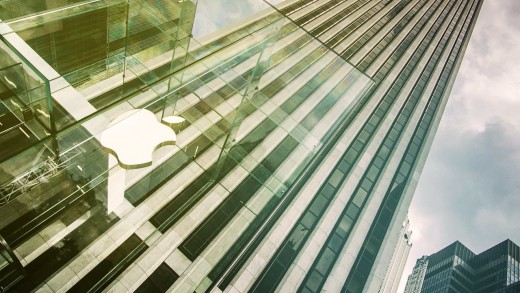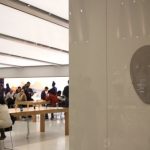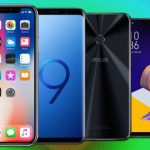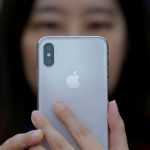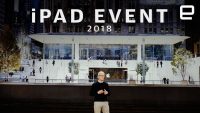Support Swells For Apple’s Opposition To iPhone Unlocking Court Order
When Apple CEO Tim Cook openly opposed a federal court order for Apple to help the FBI access the iPhone of one of the San Bernardino shooters, it was more than just a public explanation of the company’s stance. Cook’s open letter represented a defining moment in what will become a very public, global debate about the right to electronic privacy versus the needs of law enforcement and national security officials.
Though the battle between Apple and the FBI will no doubt be played out in the courts, public support for or against the FBI’s request will ultimately be an influential factor in determining the outcome, at least as future legislation is concerned.
Within hours of the publication of Cook’s letter, it became clear that many in the public supported Apple. As Business Insider reports, a group called Fight for the Future organized a small rally outside the flagship Apple Store in San Fransisco, in support of the company. Though the rally included just 30 people, the group plans to hold additional gatherings nationwide in the coming weeks, including in New York City, Boston, and Minneapolis.
The first high-profile tech leader to voice support for Apple was Google CEO Sundar Pichai, who posted a series of tweets in which he called Cook’s letter “important” and said the court ruling “could be a troubling precedent” if carried out.
Pichai’s tweets were followed by a Facebook post from WhatsApp CEO Jan Koum. “I have always admired Tim Cook for his stance on privacy and Apple’s efforts to protect user data and couldn’t agree more with everything said in their Customer Letter today,” Koum wrote. “We must not allow this dangerous precedent to be set. Today our freedom and our liberty is at stake.”
Mozilla executive director Mark Surman also put out a press statement expressing his support. “It sets a dangerous precedent that threatens consumers’ security going forward. Companies should be encouraged to aggressively strengthen the security of their products, rather than undermine that security,” he wrote.
Microsoft CEO Satya Nadella has yet to address the issue directly, but he did retweet a tweet by Microsoft president and chief legal officer Brad Smith, in which Smith linked to a Reform Government Surveillance group statement regarding encryption and security.
Edward Snowden, the National Security Agency spying whistleblower, also tweeted his support, criticizing the FBI for “creating a world where citizens rely on #Apple to defend their rights.”
Snowden was joined by other privacy rights campaigners, including the Electronic Frontier Foundation, the American Civil Liberties Union, and Amnesty International.
The EFF posted a statement on its website praising Apple. “We are supporting Apple here because the government is doing more than simply asking for Apple’s assistance,” it wrote. “For the first time, the government is requesting Apple write brand new code that eliminates key features of iPhone security—security features that protect us all. Essentially, the government is asking Apple to create a master key so that it can open a single phone. And once that master key is created, we’re certain that our government will ask for it again and again, for other phones, and turn this power against any software or device that has the audacity to offer strong security.”
“The U.S. government wants us to trust that it won’t misuse this power,” the EFF continued. “But we can all imagine the myriad ways this new authority could be abused. Even if you trust the U.S. government, once this master key is created, governments around the world will surely demand that Apple undermine the security of their citizens as well.”
The EFF also announced that it plans to file an amicus brief in support of Apple’s position.
Amnesty International deputy director of global issues Sherif Elsayed-Ali issued a statement saying that we live in a time when there is a “clear lack of checks and balances” to prevent authorities from abusing surveillance powers. He wrote “Apple is right to fight back in this case: the FBI’s request, which would in practice require Apple to rewrite its operating system to weaken security protections, would set a very dangerous precedent. Such backdoors undermine everyone’s security and threaten our right to privacy.”
Alex Abdo, the attorney for the ACLU’s Speech, Privacy, and Technology Project, released a statement on behalf of the organization: “This is an unprecedented, unwise, and unlawful move by the government. The Constitution does not permit the government to force companies to hack into their customers’ devices. Apple is free to offer a phone that stores information securely, and it must remain so if consumers are to retain any control over their private data.”
“The government’s request also risks setting a dangerous precedent,” Abdo continued. “If the FBI can force Apple to hack into its customers’ devices, then so too can every repressive regime in the rest of the world. Apple deserves praise for standing up for its right to offer secure devices to all of its customers.”
But not everyone is supporting Apple. Republican presidential candidate Donald Trump had this to say during an interview on Fox and Friends: “To think that Apple won’t allow us to get into her cellphone? Who do they think they are? No, we have to open it.”
But the debate is only in its early days. As time goes on, more public and private sector figures will line up on either side of the encryption versus national security argument, for what is sure to become one of the most defining issues of the decade.
The History of Apple (In Under 3 Minutes)
Fast Company , Read Full Story
(19)

